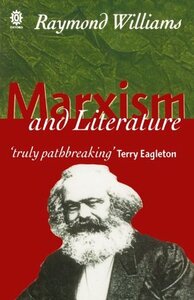Take a photo of a barcode or cover
Honestly, it was pretty okay, and I hate this kind of writing.
DNF. I'm ashamed. A great work of Marxist analysis which bored me to death. I decided to finish reading this before it finished me.
Although I had heard of him before, it's the first work I've read by Raymond Williams and he is perhaps the dryest and most arid Marxist author I've ever come across. The analysis, the theorisation, all of that was great, and this book has evidently become a classic Marxist text, but at what cost? How many people died at the hands of boredom? This is the true communist tragedy.
What frustrates me too is how one can be a literary scholar yet write like it is the concept of "monotone" itself grew hands and typed this out. Just, like, quote Shakespeare or something.
On top of it all, I'm not sure I got much out of it, and I doubt that would change much had I finished the final 50 pages or so. Perhaps some other time I can return to this book, perhaps when my soul dries out.
soz
Although I had heard of him before, it's the first work I've read by Raymond Williams and he is perhaps the dryest and most arid Marxist author I've ever come across. The analysis, the theorisation, all of that was great, and this book has evidently become a classic Marxist text, but at what cost? How many people died at the hands of boredom? This is the true communist tragedy.
What frustrates me too is how one can be a literary scholar yet write like it is the concept of "monotone" itself grew hands and typed this out. Just, like, quote Shakespeare or something.
On top of it all, I'm not sure I got much out of it, and I doubt that would change much had I finished the final 50 pages or so. Perhaps some other time I can return to this book, perhaps when my soul dries out.
soz
A great book, especially for an introduction to terms like culture and hegemony (before moving on to Gramsci's Prison Diaries which is harder to get into).
challenging
informative
inspiring
reflective
slow-paced
challenging
informative
medium-paced
read excerpt for class and wanted it to count towards my total :)
"The mistake, as so often, is in taking terms of analysis as terms of substance. Thus we speak of a world-view or of a prevailing ideology or of a class outlook, often with adequate evidence, but in this regular slide towards a past tense and a fixed form suppose, or even do not know that we have to suppose, that these exist ad are lived specifically and definitely, in singular and developing forms. Perhaps the dead can be reduced to fixed forms, though their surviving records are against it."


